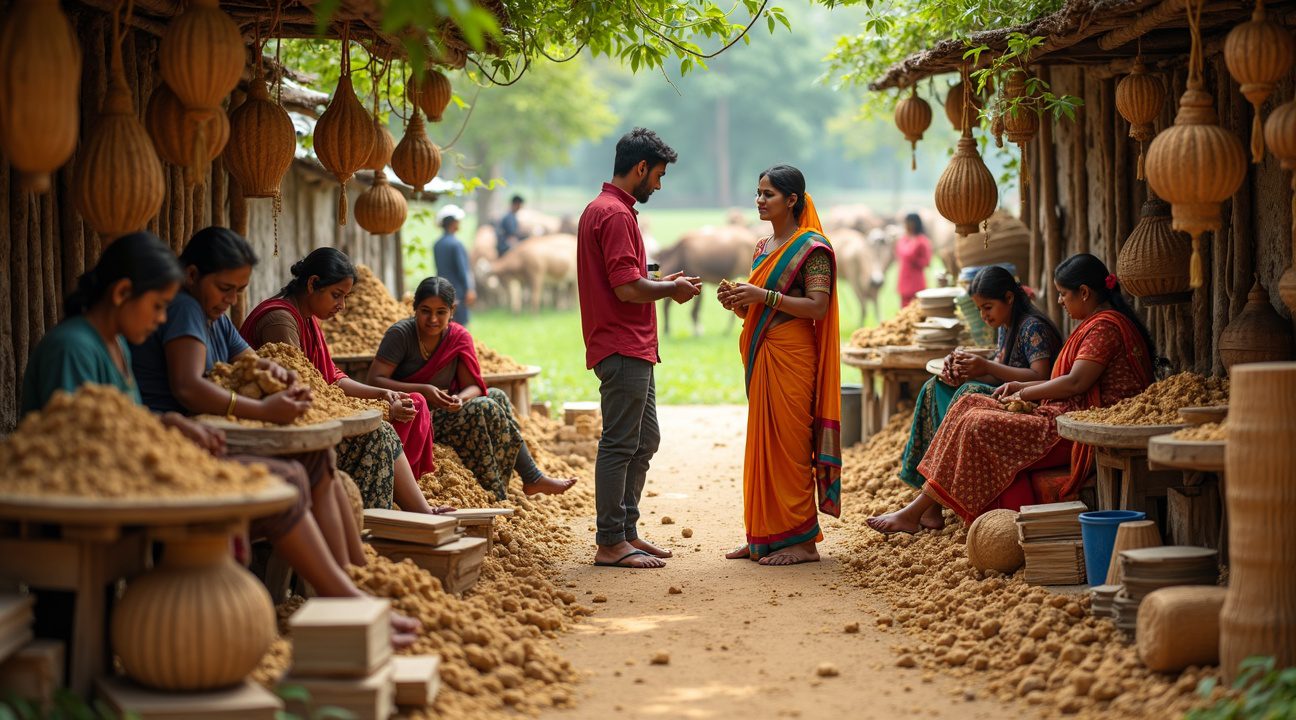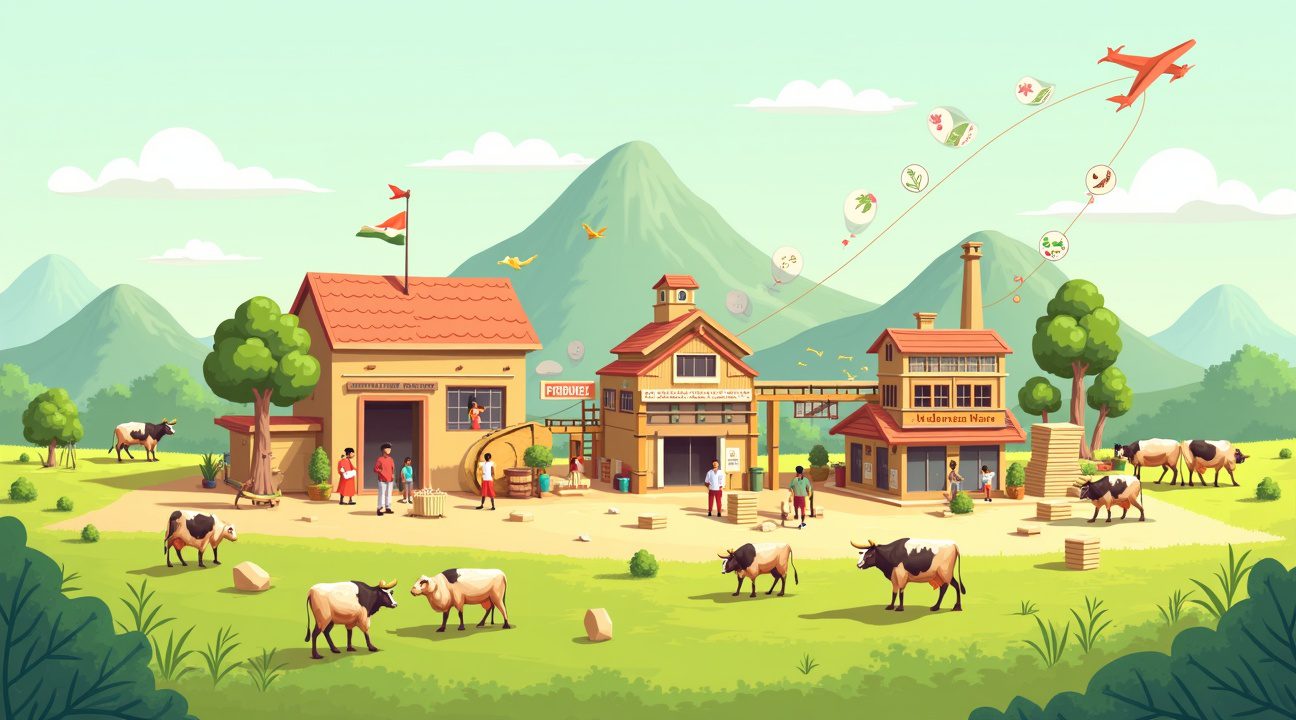A startup in India successfully transformed cow dung into a thriving business that produces biodegradable paper, packaging materials, and decorative items, generating revenues that jumped from ₹15 lakh to ₹75 lakh in just two years.
Key Takeaways
- Indian entrepreneurs build profitable businesses by converting cow dung into biodegradable paper, packaging, and home decor items that appeal to environmentally conscious consumers worldwide.
- Companies like Midas Paints achieve remarkable financial success, with revenues increasing five-fold from ₹15 lakh to ₹75 lakh within two years of operation.
- The startup sector expands through strategic micro-factory networks across India, creating decentralized production systems that reduce costs while maximizing local employment opportunities.
- International markets including the USA, UAE, Australia, and European countries drive unprecedented demand for Indian cow dung products due to superior quality for organic farming and biogas production.
- Government initiatives like Gobar Dhan Yojana and Atmanirbhar Bharat provide crucial support through funding, technical assistance, and policy frameworks that accelerate industry growth.
From Sacred Waste to Global Business: How Indian Entrepreneurs Are Turning Cow Dung Into Profit
Indian entrepreneurs have discovered a brilliant way to transform one of the country’s most abundant agricultural byproducts into profitable, sustainable businesses. Cow dung, traditionally revered in Indian culture and already used for fuel and construction, has become the foundation for innovative biodegradable products that appeal to environmentally conscious consumers worldwide.
Building on Ancient Traditions with Modern Innovation
I’ve observed how these startups cleverly build upon centuries-old practices where Indian households used cow dung for everything from floor coatings to fuel cakes. This cultural familiarity gives entrepreneurs a significant advantage when sourcing raw materials and gaining community acceptance. Rural farmers who once viewed cow dung primarily as fertilizer or fuel now see additional income streams through partnerships with these eco-friendly companies.
The production process typically involves collecting, cleaning, and processing the dung through specialized techniques that remove odors and harmful bacteria while preserving the fibrous qualities needed for paper and packaging materials. Several companies have developed proprietary methods that transform this organic waste into high-quality products that compete directly with traditional paper goods.
Diverse Product Applications Driving Market Growth
These innovative companies produce an impressive range of items that demonstrate cow dung’s versatility as a raw material. The product categories include:
- Handmade paper products including notebooks, journals, and greeting cards that appeal to premium stationery markets
- Biodegradable packaging solutions for e-commerce companies looking to reduce their environmental footprint
- Home decor items such as photo frames, lampshades, and wall art that combine sustainability with aesthetic appeal
- Corporate gifts and promotional materials that help businesses showcase their environmental commitments
- Educational supplies for schools promoting environmental awareness
Many startups have found success by targeting both domestic and international markets, with exports particularly strong in European and North American countries where consumers pay premium prices for sustainable alternatives. The global shift away from single-use plastics has created unprecedented demand for biodegradable packaging, positioning these Indian companies at the forefront of a growing industry.
Companies like Cow Dung Paper and similar ventures have reported impressive growth rates, with some achieving annual revenues in the millions of dollars within just a few years of operation. The scalability of cow dung as a raw material gives these businesses a sustainable competitive advantage, especially in regions with large cattle populations.
The economic impact extends beyond the startups themselves, creating employment opportunities in rural areas where cattle farming is prevalent. Women’s self-help groups often participate in collection and initial processing stages, providing additional household income while supporting the circular economy model. This approach addresses multiple development goals simultaneously: waste reduction, job creation, and sustainable product manufacturing.
International recognition has followed commercial success, with several cow dung product companies receiving awards for innovation and sustainability. Trade shows and environmental exhibitions regularly feature these products, helping to normalize the concept of using animal waste for high-quality consumer goods.
The success of these ventures has attracted investor attention, with venture capital firms increasingly interested in sustainable technology companies. Some startups have secured significant funding rounds to expand production capacity and develop new product lines. Additionally, government initiatives supporting sustainable businesses have provided additional resources and policy support for this emerging sector.
Quality control remains crucial for maintaining consumer confidence and meeting international standards. Companies invest heavily in testing and certification processes to ensure their products meet safety and performance requirements for various applications. This attention to quality has helped overcome initial consumer skepticism about products made from animal waste.
The cow dung industry represents a perfect example of how traditional knowledge can be combined with modern business practices to create profitable, sustainable enterprises. As global demand for eco-friendly products continues to grow, these Indian startups are well-positioned to capture significant market share while contributing to environmental conservation efforts worldwide.

Revolutionary Startups Leading the Cow Dung Economy
I’ve witnessed a remarkable transformation happening across India as innovative startups harness cow dung to create sustainable alternatives to traditional materials. This movement represents more than environmental consciousness—it’s reshaping entire industries through creative resource utilization.
Pioneering Companies Making a Difference
Dungse Labs stands at the forefront of this revolution, transforming cow dung into bioplastics and biodegradable composites that effectively replace particle boards and conventional plastics. The company’s approach demonstrates how agricultural waste can become valuable raw materials for construction and packaging industries. Their products offer comparable strength and durability while maintaining complete biodegradability.
Midas Paints has taken a different approach by incorporating cow dung into eco-friendly paint formulations. Their innovative products deliver impressive durability while remaining affordable for consumers across various economic segments. The company’s paints resist moisture and provide excellent coverage, proving that sustainable materials don’t require performance compromises.
Several other startups continue expanding this sector’s potential. Companies focus on creating:
- Decorative items
- Packaging solutions
- Paper products
These appeal to environmentally conscious consumers and transform what was once considered waste into premium products that command competitive market prices.
Government support has played a crucial role in accelerating this industry’s growth. The ‘Gobar Dhan Yojana’ initiative specifically promotes waste-to-wealth projects, providing funding and infrastructure support for cow dung-based ventures. This program recognizes the dual benefits of waste management and economic development in rural areas.
The ‘Atmanirbhar Bharat’ campaign further strengthens these companies by encouraging domestic manufacturing and reducing import dependencies. Startups receive technical assistance, financial backing, and market access through various government channels. Much like how space technology innovations require substantial support systems, these agricultural innovations benefit from comprehensive governmental frameworks.
These startups address multiple challenges simultaneously:
- They reduce agricultural waste accumulation
- Create employment opportunities in rural areas
- Provide sustainable alternatives to environmentally harmful products
Farmers now generate additional income streams by selling cow dung to processing facilities, creating win-win scenarios across the supply chain.
The success of these companies demonstrates India’s capacity for innovative problem-solving using locally available resources. Their achievements inspire similar ventures across developing nations facing comparable waste management and sustainability challenges. Market acceptance continues growing as consumers recognize the environmental and economic benefits of these products.
The Diverse Product Portfolio Creating Global Buzz
Cow dung’s transformation into commercially viable products spans multiple industries, creating a sustainable alternative that’s capturing international attention. The innovative startup has developed an impressive range of items that challenge conventional manufacturing approaches while delivering practical solutions for environmentally conscious consumers.
Traditional and Modern Applications
The product line begins with traditional items like incense sticks and diyas, which have deep cultural significance in Indian households. These handcrafted products maintain authentic fragrances and burning qualities while eliminating harmful chemicals typically found in commercial alternatives.
Paper production represents another breakthrough application, where processed cow dung creates surprisingly durable writing materials and decorative papers that decompose naturally without leaving toxic residues.
Eco-friendly packaging solutions have emerged as the company’s flagship offering. These containers and wrapping materials provide the same protective qualities as plastic packaging while breaking down completely in soil within months. Restaurants, food delivery services, and retail companies increasingly choose these options to align with sustainability goals and reduce their environmental footprint.
Global Market Expansion and Export Success
International demand has driven the expansion into specialized product categories that leverage cow dung’s unique properties. Organic farming products include processed fertilizers and soil conditioners that enhance crop yields without synthetic chemicals. NASA testing suborbital flights showcases how innovation crosses boundaries, much like how this startup’s products are crossing international borders.
Biogas production materials offer another revenue stream, with compressed cow dung serving as fuel for cooking and heating in regions seeking renewable energy alternatives. European and North American markets particularly value these products for their carbon-neutral properties and contribution to circular economy initiatives.
Ayurvedic treatment products represent a growing segment where processed cow dung becomes an ingredient in traditional wellness formulations. These products appeal to health-conscious consumers who prefer natural ingredients over synthetic compounds. The global wellness industry’s expansion has created opportunities for authentic Ayurvedic products that maintain traditional preparation methods.
The zero-waste movement has amplified demand across all product categories. Companies implementing comprehensive sustainability programs actively seek suppliers who can demonstrate genuine environmental benefits rather than superficial green marketing. This startup’s products meet strict biodegradability standards while maintaining performance characteristics that match or exceed conventional alternatives.
Export statistics reveal consistent growth in shipments to countries prioritizing environmental regulations. Mark Zuckerberg apologizes demonstrates how accountability matters in business, similar to how this company takes responsibility for environmental impact through transparent production processes.
Quality control measures ensure products meet international standards for safety and performance. Each item undergoes testing for durability, decomposition rates, and absence of harmful substances. Certifications from recognized environmental organizations validate claims about biodegradability and sustainable sourcing practices.
Distribution networks have expanded to include specialty retailers, online marketplaces, and direct sales to corporations implementing sustainability initiatives. Superman Legacy has its cast illustrates how franchises build comprehensive universes, paralleling how this startup has built a comprehensive product ecosystem from a single raw material.
Manufacturing scalability remains crucial for meeting growing demand while maintaining quality standards. The production process has been refined to handle larger volumes without compromising the handcrafted quality that differentiates these products from mass-produced alternatives. Investment in equipment and training has enabled consistent output that satisfies both domestic and international orders.
Market feedback consistently highlights customer satisfaction with product performance and environmental benefits. The military sleep method shows how simple techniques can be highly effective, similar to how this straightforward approach to sustainable manufacturing delivers impressive results across multiple product categories.
International Markets Driving Unprecedented Demand
Indian cow dung has emerged as a surprisingly valuable export commodity, finding eager buyers across the globe. Countries including the USA, UAE, Australia, and various European nations are importing this traditional material for applications that extend far beyond its conventional uses. This international appetite demonstrates how traditional materials can find new life in modern, sustainability-focused markets.
The global demand for cow dung continues to surge, driven primarily by its essential role in organic farming practices and biogas production systems. Farmers worldwide are rediscovering the benefits of natural fertilizers, moving away from synthetic alternatives that have dominated agriculture for decades. This shift creates substantial opportunities for Indian suppliers who can meet quality standards and export requirements.
Premium Quality Sets Indian Cow Dung Apart
International buyers specifically seek Indian cow dung because of its exceptional microbial content and naturally occurring enzymes. These biological components make it superior for organic farming applications, where soil health depends on active microbial communities. The unique dietary patterns of Indian cattle, often grass-fed and consuming diverse plant materials, contribute to this enhanced quality profile.
European markets particularly value these qualities for their organic certification programs, while Australian buyers integrate Indian cow dung into their sustainable agriculture initiatives. The UAE market focuses on biogas applications, where the high methane production potential of quality cow dung translates directly into energy output efficiency.
This international recognition validates what Indian farmers have known for centuries – cow dung contains powerful natural properties that benefit both soil and energy production. Modern testing methods now quantify these benefits, providing the scientific backing that international buyers require for their quality assurance programs.
Export volumes have grown consistently as more countries recognize the environmental advantages of natural materials over synthetic alternatives. The biogas sector alone represents a massive growth opportunity, with developed nations investing heavily in renewable energy infrastructure that depends on high-quality organic feedstock.
Processing facilities in India are adapting to meet international standards, implementing quality control measures that ensure consistent microbial counts and enzyme activity levels. This attention to quality has opened doors to premium market segments where buyers pay significantly more for verified organic materials.
The export success also benefits local communities, creating new income streams for rural farmers who previously viewed cow dung primarily as a local resource. Collection networks now span across multiple states, connecting small-scale producers with international distribution channels.
Advanced packaging and preservation techniques maintain the biological activity of exported cow dung during transport, ensuring that international buyers receive products with full potency. These innovations have eliminated previous concerns about quality degradation during shipping, making Indian cow dung a reliable choice for time-sensitive applications like biogas production startup cycles.
Financial Success Stories and Ambitious Expansion Plans
The cow dung-based business model has proven remarkably profitable for Indian entrepreneurs who’ve embraced this unconventional approach. Midas Paints stands as a shining example of what’s possible when innovation meets sustainability, demonstrating revenues that skyrocketed from ₹15 lakh to ₹75 lakh in just two years. This five-fold increase showcases the massive market potential for eco-friendly alternatives in India’s packaging and paper industries.
Scaling Through Strategic Micro-Factory Networks
Dungse Labs has developed an ambitious strategy that could revolutionize how cow dung products reach consumers across India. The company plans to establish micro-factories throughout the country, creating a decentralized production network that reduces transportation costs while maximizing local employment opportunities. This approach allows for fresher products, shorter supply chains, and stronger community connections.
The micro-factory model offers several distinct advantages for entrepreneurs entering this space:
- Smaller production units require lower initial investments compared to large-scale manufacturing facilities.
- Local sourcing becomes more efficient when production happens closer to cattle farms.
- Quality control improves when operations remain manageable in size.
- Each micro-factory can adapt products to regional preferences and requirements.
Government Support Fuels Industry Growth
The Indian government has recognized the potential of cow dung entrepreneurship through various supportive initiatives that encourage sustainable business practices. These programs provide financial assistance, technical guidance, and market access opportunities for startups working with agricultural waste materials. Government backing helps legitimize the industry while reducing barriers to entry for new entrepreneurs.
Policy makers understand that cow dung-based businesses address multiple challenges simultaneously — waste management, rural employment, and environmental protection. Support comes through:
- Startup incubators
- Research grants
- Preferential procurement policies that favor eco-friendly products
This institutional backing creates confidence among investors and customers alike.
The success stories emerging from this sector demonstrate how traditional materials can find new life in modern applications. Companies like sleep innovation pioneers have shown that unconventional approaches often yield breakthrough results. Similarly, entrepreneurs working with cow dung products are discovering that consumer acceptance grows rapidly once people experience the quality and environmental benefits firsthand.
Market expansion continues accelerating as awareness spreads about the environmental impact of conventional paper and packaging materials. Corporate buyers increasingly seek sustainable alternatives that don’t compromise on functionality or aesthetics. The combination of strong financial performance, scalable business models, and government support positions cow dung-based enterprises for sustained growth across India’s diverse markets.
Investment interest has surged as proof-of-concept companies like Midas Paints demonstrate consistent profitability and market acceptance. Early adopters are establishing competitive advantages while building brand recognition in this emerging sector.

Sources:
Dungse Labs
Midas Paints
Delmer Group
The Shillong Times
Startup Chai


